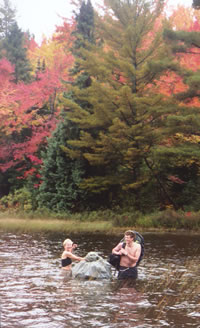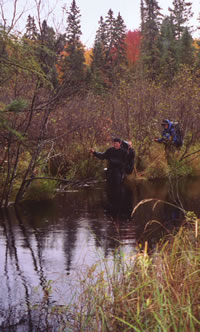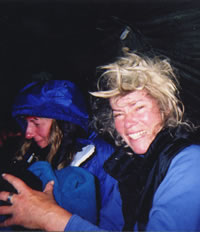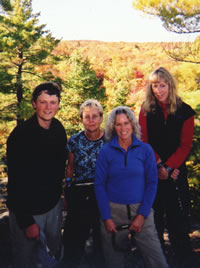|
On a cool, cloudy morning following a night
of intermittent drizzle, five of us assembled in the Hungry
Hollow Cafe in Big Bay. This was the starting point for our
October backpacking trip in the McCormick Tract.
To anyone not knowing our plans for the
weekend, we probably looked like perfectly reasonable people.
Had we known what challenges Mother Nature had in store, some
of us might have equipped ourselves a little differently,
but being serious wilderness addicts, we probably would have
gone ahead with the plan anyway....
Consuming pancakes, etc., with me were
Jane Beckwith of East Lansing, Michigan, Gail Staisil of Midland,
Michigan, Aaron Cliff of Marquette, Michigan, and trip leader
Michael Neiger of Marquette, Michigan. After several refills
of coffee, we had caught up sufficiently on each other's lives
to turn our attention to the trip at hand.
Securing permission to leave the mere two
wheel drive vehicles at the edge of the cafe's parking lot,
we loaded our gear into those with four wheel drive that had
a better chance of being able to handle the back roads, and
headed for the trailhead. The forty-five minute drive afforded
tantalizing vistas of the country we would be hiking in--rocky
hills covered with dense mixed forest changing to its autumn
colors.
Upon reaching the trailhead at the northern
edge of the tract we weighed our packs and made some final
gear choices. Then, this being a Michael Neiger trip, we turned
our back on the trail and began instead to cut an azimuth
to a spot that looked interesting on the topos.
It was a perfect day for hiking, cool with
mostly sunny skies punctuated by a few dark clouds. The mostly
hardwood forest was not difficult to travel in. We had a new
group member, Aaron, to get acquainted with. It was an auspicious
beginning.
Adding to the good things, we completed
our 2000-meter azimuth right on target--coming up against
the base of a rocky hill that was easy to see on the map,
but invisible among the trees until we were almost face to
face with its stone wall.
Working our way around it, we started for
our next objective, a small box canyon Michael had discovered
on a previous trip. After some brief instruction, Aaron took
over cutting the azimuth on point. Like a seasoned pro, he
took us right to the little box canyon.
Rocky outcrops rose on three sides of us
darkening the spaces between the trees. Everything was cool
and damp. The stream that drained the valley burbled softly
in the undergrowth. After taking in this beauty for a while,
we decided it was time for a scenic overlook and climbed the
most precipitous hill to catch glimpses of the surrounding
countryside.
A short break was spent talking and enjoying
the view. Then we headed for our proposed campsite on Island
Lake. After wandering through a bit of swamp along the lake,
we found the intended spot--an open area in the pines on a
small peninsula overlooking the water.
Intermittent gusty winds and approaching
clouds suggested a storm. Most of us set up our shelters back
a bit in the trees, but Aaron's tent went up in full view
of the lake. After dinner he had to get the hang of bear hangs--no
small feat in the dark. The evening ended with everyone retiring
to their shelters for a bit of reading.
It rained intermittently through the night.
Morning was damp and overcast, but seemed a bit warmer--maybe
45 or 50. Aaron had mentioned several times that he was hoping
there would be a stream crossing on this trip as he had never
done that with a pack. The shortest path to our first objective
for the day was directly across the narrow  strip
of lake right in front of our campsite--a perfect opportunity
to practice! strip
of lake right in front of our campsite--a perfect opportunity
to practice!
Mary Powell of
Flint, Michigan and
Aaron Cliff of
Marquette, Michigan
ford a narrows on
Island Lake.
(Photo by Gail Staisil)
View Gail Staisil's
Photo
Album from this trip
Some participants, however, were not enthused
at the prospect. So Aaron and I did the swim, floating our
packs in front of us and hurriedly changing to dry clothes
on the far shore. We explored some rocky bluffs, getting warm
with the effort and waited for the rest of the group to hike
around the lake. A carefully cut azimuth then took us to Lake
Dortay where we had lunch.
Clouds continued to roll in and it drizzled
or frankly rained much of the afternoon. We made our way through
the dripping woods to Upper Baraga Lake and followed its shore
toward a campsite Michael had located on another of his trips.
He said it was located on a raised peninsula
in Middle Baraga Lake and we were motivated to push onward
despite the rain by promises of a spectacular view.
As the afternoon progressed, the persistent
precipitation found some weak spots in my raingear. Water
began to trickle between my shoulder blades.
On a break I put my pack towel around my
neck to soak up some of it. Later, as we waited while Michael
double checked our position, I wrung out the towel, thinking
fondly of the Gore-Tex jacket I'd left in the trunk because
it weighed a bit more than the one I had on. My clothes were
soaked. Water had reached my boots and they squished with
each step...
It was late afternoon. The temperature
was dropping and the wind was picking up. Another hour's bushwhacking
brought us to the proposed bivouac.
The view was indeed awesome--the lake
could be seen through the pines on all sides of the little
point. Unfortunately, standing in that raised open area bore
a distinct resemblance to being on the test stand in a wind
tunnel.
My body temperature headed southward at
an alarming rate and I could see the others shiver too. Michael
stated what we all were thinking: this was not going to be
a good place to camp. He suggested that we wade across the
narrows to the other side of the lake and look for a spot
in the thicker woods since we were headed there the next day
anyway.
I was more than a little anxious to get
out of the wind. Approaching the water it was obvious that
"wade" was an understatement: it was at least knee
deep. Deciding that there was no way I could get any wetter,
I walked on in.
Preoccupied with getting to shelter, I
didn't hear the others calling, entreating me to loan my sandals
to Jane if I wasn't going to use them... Somewhere near the
end of the crossing, getting warm began to seem less important.
I climbed the small hill on the far shore
feeling very detached and wondering if we were to camp right
here or travel on a little further. Gail made it across and
said to look for a place to camp.
I wandered back and forth thinking alternately
that there were no good spots or that they were all OK. Aaron
arrived and confirmed that we were to camp here.
I set my pack down and looked for something
dry to put on. Water had filled the dependent bulge at the
bottom of my pack cover and wicked up into my clothes bag.
I put a very damp jacket under my raingear and donned an almost
dry hat.
Michael and Jane made it over. He told
us to get set up, get dry, and eat something hot.
I saw Gail looking for hammock trees. I
got out my tarp and had to concentrate to figure out how to
put it up. Then my fingers were too cold to tie decent knots.
When I had a shelter of sorts, I asked
Michael if I should look for firewood before it got totally
dark. He said I should get water and make something hot to
eat. I wasn't sure I could do that, but couldn't muster the
resolve to object either.
My Nalgene bottle was on top of my pack.
I remembered that the lake was down the hill. I felt like
I was watching someone else instead of doing things myself
and chuckled mentally to see that I was in such sorry shape.
It seemed to take a long time, but I got
back with the water, managed to get a cube of Esbit fuel out
of its package, get it lit and set the pot on it to boil.
I wondered absently if wet polypro bottoms
were worth putting on. I really wanted a nap... I put on the
wet underwear and started eating a PowerBar because a part
of my mind was nagging: "You HAVE to keep doing something..."
Darkness arrived. I no longer felt cold--just
tired. My arms and legs were heavy and stiff. When about half
the bar and half a cup of coffee were gone, Aaron came over
asking about starting a fire.
The part of my mind that was trying to
keep me moving latched onto the idea as something to do--though
looking out at the sodden vegetation, the probability of our
getting anything to burn seemed small.
I got up and began to look for firewood
with him. There seemed to be only two kinds: pieces too small
to have any dry wood in the center and ones too big to split
with my three inch knife blade. We gathered some of them anyway.
Going out for one more look, I happened
to spot a fallen spruce at the edge of the light from my headlamp.
There was an arm-sized piece of splintered wood sticking up.
It broke off with a satisfying crack.
Looking along the trunk I saw that bark
split when the tree fell was covering several more broken
pieces. Dry wood! It was, however, firmly attached to the
fallen tree. I began to reef on it--repeatedly pushing and
pulling at it.
Suddenly I was shivering again and very
aware of how cold I was. Building a fire no longer seemed
just an interesting exercise: it was crucial, we HAD to succeed....
Aaron came over and we managed to get several
large pieces loose and drag them back to my tarp. I cleared
the wet leaves from a barren space near the front edge of
the tarp and split some kindling from the relatively dry spruce
pieces.
The activity had warmed my hands enough
to work the lighter but it was hard to get the flame in the
right place for the shivering. I finally succeeded, set the
burning fire starter on some twigs in the middle of that cold,
wet space and quickly piled slivers of spruce around it.
I held my breath watching the tiny flame.
After a few seconds the slivers began to burn. There was hope!
I added more fuel and the flames climbed up between the pieces.
After a few minutes there was perceptible
heat. We added larger wetter pieces. They dried and the flames
continued to grow.
From Jane's location in the darkness, there
was an exclamation: "Oh! I didn't know you had a fire,
I'm coming over!" There was a brief rattling of metal
from that direction and she appeared in the firelight ready
to cook.
What an optimist! Things continued to go
well, however. The flames grew and a pile of coals developed.
My shivering decreased.
Michael finished eating and began to buck
up some larger pieces of wood with his Bowie. Soon we had
an ample supply.
We spent the balance of the evening breathing
smoke and alternately exposing body parts to the heat. Our
clothing steamed. There was the smell of wet wool and an occasional
whiff of overheated boot rubber.
One by one we got our pots on the fire
and filled our stomachs. The chill receded and conversation
became cheerful.
At one point Aaron said, "Guess you
have to take what you get--sometimes shit happens out here..."
Jane responded with a grin, "This
is the shittiest trip I've ever been on!" By the time
we headed for our sleeping bags we had stored up enough heat
for a comfortable night.
I awoke in the chilly gray of early dawn.
There was a thin ring of ice in my water bottle. Depression
moved in like a dark cloud: I was toasty in my sleeping bag,
but with the leaky rainsuit, I had no way to stay dry. I was
afraid of being cold again.
There didn't seem to be much alternative
to getting up though. Coffee helped. After packing, we broad
scattered the sodden ashes of the campfire, stirred the soil
and put the excavated vegetation back, leaving the site much
as it had been when we arrived.
We headed east toward our objective for
the day, White Deer Lake. We planned to see the remains of
a recreational lodge from the early 1900's and to look for
a place called The Fortress, which had been a day use area
in that time, providing an overview of the lake.
As we walked the clouds thinned and patches
of blue sky appeared. By the time we reached the lake only
a few fluffy clouds remained and we picked a sheltered, sunny
area near the site of the old lodge for lunch.
Only the foundations remained but I found
them aesthetically very interesting and took quite a few pictures.
The poured concrete walls were intact and their crisp geometric
shapes contrasted with the softer outlines of the plants growing
around them.
There was a complex play of light and shadow
overlaid on patterns made by dampness left from the rain.
Fine cracks were edged with minerals leeched from the cement.
Rectangular window openings and round stovepipe
holes framed brilliant fall colors and the blue sky. Awesome!
Where are the sketchpad and watercolors when you really need
them?
Lunch was pleasant if perhaps a little
chilly. There was a small rocky island offshore that seemed
to have the scant remains of some more buildings. Its bareness
made me want to go out there and plant something. When we
were about to wrap up the meal Jane said, "Look, there's
a blonde woman over there!" One of the guys said, "Yeah,
right!"
Jane said, "No, really there is...
she's walking by the water." Skeptically we turned our
eyes where she was pointing and, sure enough, there WAS a
blonde by the lake. She came over to where we were seated
and we struck up a conversation.
Her name was Michelle and she was out for
a hike on her day off. She'd walked up an old two-track from
the south side of the tract about three miles away. We plied
her with chocolate to find out more.
She was a college student whose current
job consisted of tracking down moose tagged with radio transmitters
to see if they had produced any offspring. She was going to
be in the area just a few more weeks, then was moving to another
wilderness job out west.
No amount of chocolate would persuade her
to divulge the results of the moose population study though...
So, after inviting her to hike with us some time, we finished
packing up our things and arose to go in search of The Fortress.
After wandering a bit along the edge of
the lake, Michael gave Gail an azimuth and she expertly led
us to a rocky bluff on the northwest shore of the lake.
At the bottom it wasn't very impressive,
but Gail scouted out the remnants of an old hiking trail and
followed it upward. Upon reaching the top we saw why the former
owners had liked the spot--we were a couple hundred feet above
the water with a panoramic view of the lake and the surrounding
forest.
The blue sky and the fall colors were reflected
in the water. A tiny island lay below with a couple of cedars
clinging precariously to its rocky surface.
A small flock of Canada geese flew by at
eye level. Though it was mid afternoon, it only took us a
few minutes to decide to spend the night on the Fortress.
Exploring a bit, we found the remains of
a large raised grill and a bench with a view of the lake.
We climbed down to get water and returned to set up our shelters.
Then it was R&R. A very leisurely evening
meal was followed by the sunset and then the stars.
Aaron decided to sleep out under them.
Michael and Gail heard an owl calling on their side of the
bluff. Relaxation gave way to peaceful sleep.
I was awakened in the night by the sounds
of Aaron scurrying toward his tent and rain falling on my
tarp. I pulled down the front edge, moved farther back to
get out of the spray, and fell back asleep.
Opening my eyes again at dawn, I saw that
it was still raining. Sitting up I noticed that someone had
left their boots out in the area where we had gathered for
dinner and they had about half an inch of water in them.
Looking for my boots so I could retrieve
my food bag, I discovered the ones out in the rain were mine.
Oh, well....they hadn't quite dried out from the last soaking
anyway...
Over breakfast I learned I wasn't the only
one who didn't have their act together: Aaron had forgotten
to put the fly on his tent and had slept in the rain for quite
a while...
We packed slowly after breakfast hoping
the rain would stop, but gave in eventually and started out
in a light drizzle.
We headed north and east toward the Yellow
Dog River and the cars. The sky was a study in grays and the
rain fell steadily. We lunched under a tarp. 
Aaron Cliff of
Marquette, Michigan
and Jane Beckwith
of Lansing, Michigan
work their way across
the East Branch of the
Yellow Dog River.
(Photo by Gail Staisil)
View Gail Staisil's
Photo
Album from this trip
By afternoon it seemed like water was everywhere--running
down the trees, dripping from rocks and leaves, flowing in
rivulets, standing in puddles.
We splashed on, thinking a raft might be
necessary soon...or maybe an ark. We hunted for an old hiking
trail that would have taken us where we wanted to go, but
didn't find it.
By four o'clock I was soaked again. When
I bent forward water trickled down my chest; when I stood
up it ran down my back.
When we thought it couldn't rain any harder,
it did.
The temperature was dropping again too--a
fire was definitely in the plan for the evening. We began
looking for a place to camp--not an easy thing to find in
those thickly vegetated, rocky hills.
Finally we came upon a relatively level
area with rocky bluffs to one side. A slight rise was partly
encircled by a huge puddle of water. It was raining hard and
water was pouring off the vegetation.
Michael asked us if we wanted to camp
with that puddle as our water source or go on awhile: the
way the terrain was lining up with the map he thought we would
find an abandoned beaver pond and the elusive trail we'd looked
for just a little way beyond the hill.
Aaron said, "I think we should stay
here--it's the first dry spot we've seen in hours. Just goes
to show that everything is relative: in a deluge anything
above the water line is "dry."
Shelters went up quickly. Michael and Aaron
gathered and cut up a number of sizeable logs.
I split some into kindling and got out
a fire starter. It refused to stay lit in all that wetness.
I got out a cube of Esbit fuel and moved
a little farther under the tarp. Even then it took a bit of
coaxing before the flames really got going.
Michael, who normally eschews such conflagrations,
was telling me how to make it bigger so everyone could get
warm. Soon there was a bed of glowing coals about four feet
long and clouds of steam were rising from our polypro.
Pots of food moved on and off the heat.
By the end of the evening we were well fed, thoroughly smoked
and relatively dry.
Jane took off her balaclava for the first
time in four days. Her normally neat hair was tangled and
standing out in all directions. We joked about starting a
new page on the Web site: examples of "hat hair"
seen on our  trips. trips.
Gail Staisil of
Midland, Michigan
and Jane Beckwith
of East Lansing, Michigan
enjoy a laugh as Jane
removes her balaclava
under the shelter of
Mary Powell's tarp.
(Photo by Mary Powell)
View Gail Staisil's
Photo
Album from this trip
The water level in the puddle nearby had
risen 'til it flooded part of Aaron's tent and was crowding
Michael's tarp.
Aaron decided to sleep under my tarp by
the fire. As the others retired to their shelters, he spread
his sleeping bag on the ground. I asked where his pad was.
He said it was in his tent, probably floating.
I told him he'd be needing it. He said he didn't want to get
wet again to retrieve it. I didn't argue--experience is a
great teacher.
Dawn was chilly. There were patches of
snow in the low spots, frozen droplets on our tarps and a
rim of ice crystals on the puddle. Aaron got up very early
and went in search of his pad.
I got up just after first light and gathered
some small pieces of wood for a finger warming fire. Stirring
the ashes a bit, I found enough coals to get it started. It
had the desired effects: warm fingers and company for breakfast.
By the time we were packed and had the
fire cleaned up it was mid morning. We joked about not being
able to get off the afternoon shift on this trip. Heading
off over the hill we found the abandoned beaver pond and the
adjacent hiking trail right where Michael thought they would
be.
We followed the path when we could find
it and kept to a rough azimuth when we couldn't.
After a while, we came to the West Branch
of the Yellow Dog River and followed it. Along the way, Aaron
found a nice shed from a 12-point
buck.
Before long, we came to a series of very
pretty waterfalls. We took a short lunch break in a clearing
among the hardwoods then continued down the river looking
for a place to cross.
There was a nice site for a future bivouac
in some pines on a bluff above the rushing water. We crossed
in an area where the stream split into several small branches.
On the far side we found the trail we'd
turned our backs on at the beginning of the trip and followed
it back to the cars, savoring this last hour in the bush.
At the trailhead we found the cars
lightly decorated with fallen leaves. We changed into REALLY
dry clothes and headed for the Border Grill in Marquette for
a parting meal. Another good trip--and a good lesson in the
rigors of cold, wet weather.
Read
another journal...
|



 strip
of lake right in front of our campsite--a perfect opportunity
to practice!
strip
of lake right in front of our campsite--a perfect opportunity
to practice! 
 trips.
trips.